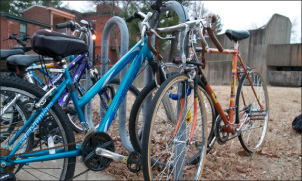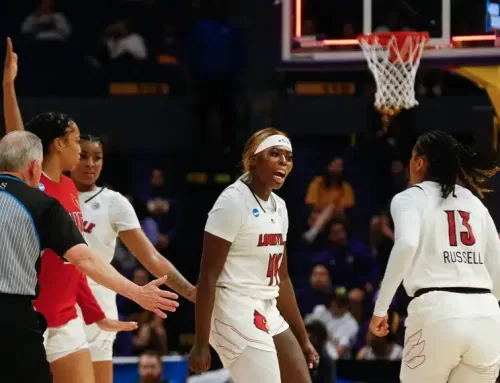Bicycles are a common sight on campus. Many people use them to get around. However, there are few who actually bike to and from the University of Louisville’s campus.
Many students say they would like to cycle around the city, but can’t find the time or don’t know how to bike safely.
“A lot of people are not confident [in] feeling safe or comfortable biking to campus,” said Justin Mog, assistant to the provost for sustainability initiatives.
However, the Sustainability Council at U of L recently received the Paul Nye Memorial Education Grant for $10,000, which it plans to use to start a bicycle safety program.
According to Mog, there can be up to a dozen people in the first class. These 12 will go on to teach others in classes of their own.
“It’s a train the trainer program,” said Mog.The course will focus on things like basic bike maintenance, traffic safety and dressing for the weather.
There are some concerns from potential cyclists, as safe routes are sometimes hard to find.
This is easily solved, however, as this new program also provides free maps with alternative routes to bike to campus and around Louisville safely.
“It will increase people’s confidence in their ability to be a regular cyclist,” said Karen Newton, the director of Health Promotion for Campus Health Services.
“Cycling uses major muscle groups,” said Newton. “It builds strong legs and a strong upper body.” According to Newton, physical activity is a big part of staying healthy while in college.
The Centers for Disease Control and Prevention recommends that adults 18 and over get at least two and a half hours of exercise each week. In addition, they should participate in muscle-strengthening activities at least two days a week.
According to Mog, if they biked to campus, not only would students and faculty be more physically active, but they’d also be helping the environment.
“Nine percent of our greenhouse gas is just people driving on and off campus,” said Mog. He said that as gas prices escalate, biking seems to be an increasingly promising alternative.
Some students, such as Jonathan Graves, a freshman computer information systems major and an on-campus resident, see biking as a convenient alternative to walking across campus.
“It’s so much quicker than walking to the Natural Sciences Building,” said Graves.
In educating students and faculty on the health and environmental benefits, the goal of the safe cycling program is to change the way that they view cycling. Newton noted that many students might have to adjust.
“I have lived in places where cycling was actively promoted and safe for commuters,” said Newton. “It’s a welcome cultural shift happening at U of L.”
According to some, cycling also has less tangible benefits
“It lets you be in touch with the world that you are traveling through,” said Dr. Mark French, a civil and environmental engineering professor and the faculty sponsor of the U of L bicycling club.
Whatever the reason for bicycling, U of L hopes to use this grant to make changes.
“Bicycling is a great combination because it is good for personal health and it is also good for planet health,” said Newton.





